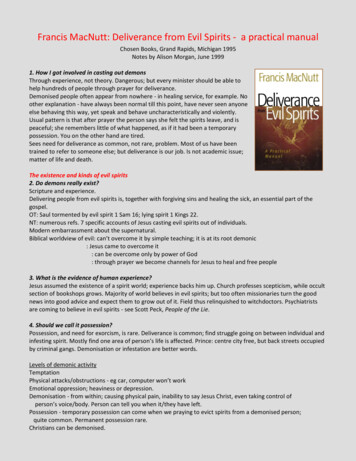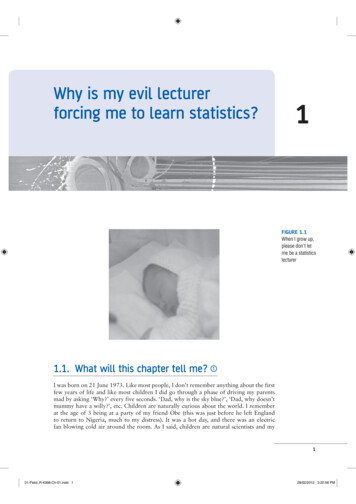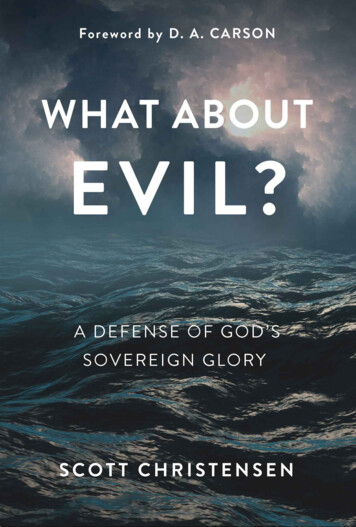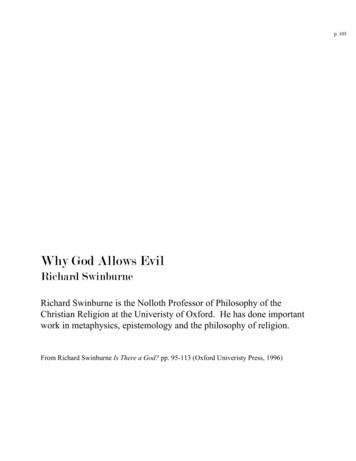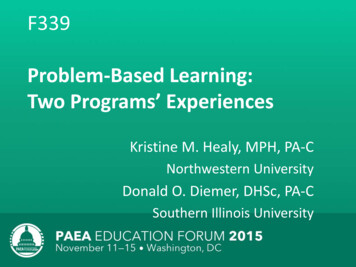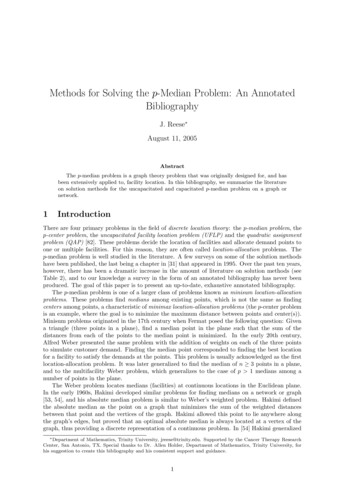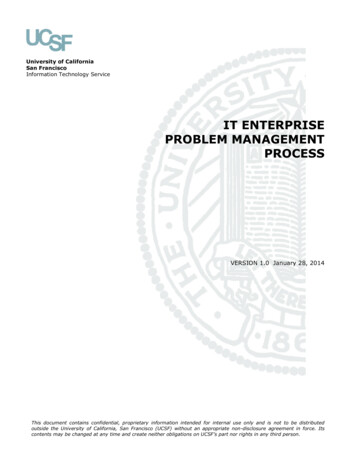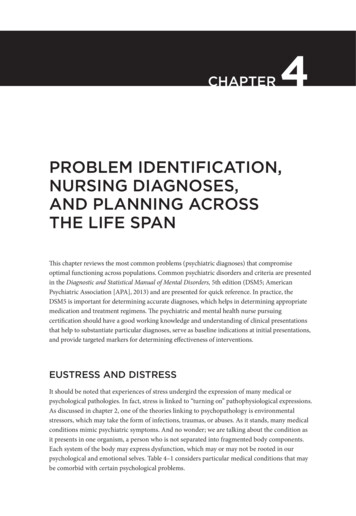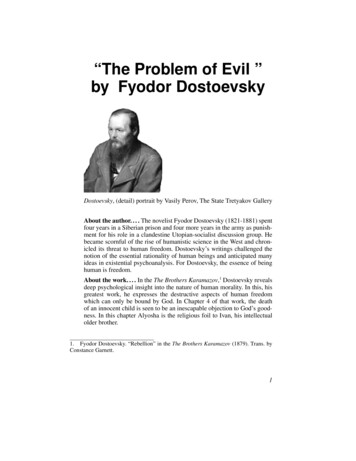
Transcription
“The Problem of Evil ”by Fyodor DostoevskyDostoevsky, (detail) portrait by Vasily Perov, The State Tretyakov GalleryAbout the author. . . . The novelist Fyodor Dostoevsky (1821-1881) spentfour years in a Siberian prison and four more years in the army as punishment for his role in a clandestine Utopian-socialist discussion group. Hebecame scornful of the rise of humanistic science in the West and chronicled its threat to human freedom. Dostoevsky’s writings challenged thenotion of the essential rationality of human beings and anticipated manyideas in existential psychoanalysis. For Dostoevsky, the essence of beinghuman is freedom.About the work. . . . In the The Brothers Karamazov,1 Dostoevsky revealsdeep psychological insight into the nature of human morality. In this, hisgreatest work, he expresses the destructive aspects of human freedomwhich can only be bound by God. In Chapter 4 of that work, the deathof an innocent child is seen to be an inescapable objection to God’s goodness. In this chapter Alyosha is the religious foil to Ivan, his intellectualolder brother.1. Fyodor Dostoevsky. “Rebellion” in the The Brothers Karamazov (1879). Trans. byConstance Garnett.1
“The Problem of Evil ” by Fyodor DostoevskyFrom the reading. . .“But then there is the children, and what am I to do about them?That’s a question I can’t answer.”Ideas of Interest from The BrothersKaramazov1. Why does Ivan think that children are innocent and adults are not?Why does he think we can love children when they are close, but wecan only love our neighbor abstractly?2. Does the General deserve to be shot for turning his hounds upon thechild? Explain an answer from a religious point of view.3. What does Ivan mean when he says, “I hasten to give back my entrance ticket.”4. List five or six possible explanations which are sometimes taken toaccount for the death of an innocent child in a universe created byGod.5. What does Alyosha mean when he says to Ivan, “That is rebellion”?Siberian Convict Colony, Russia, Library of Congress2Reading For Philosophical Inquiry: A Brief Introduction
“The Problem of Evil ” by Fyodor DostoevskyThe Reading Selection from TheBrothers Karamazov[Love Your Neighbor]“I must make one confession” Ivan began. “I could never understand howone can love one’s neighbours. It’s just one’s neighbours, to my mind,that one can’t love, though one might love those at a distance. I once readsomewhere of John the Merciful, a saint, that when a hungry, frozen beggar came to him, he took him into his bed, held him in his arms, and beganbreathing into his mouth, which was putrid and loathsome from some awful disease. I am convinced that he did that from ‘self-laceration,’ from theself-laceration of falsity, for the sake of the charity imposed by duty, as apenance laid on him. For anyone to love a man, he must be hidden, for assoon as he shows his face, love is gone.”“Father Zossima has talked of that more than once,” observed Alyosha;“he, too, said that the face of a man often hinders many people not practised in love, from loving him. But yet there’s a great deal of love inmankind, and almost Christ-like love. I know that myself, Ivan.”“Well, I know nothing of it so far, and can’t understand it, and the innumerable mass of mankind are with me there. The question is, whetherthat’s due to men’s bad qualities or whether it’s inherent in their nature. Tomy thinking, Christ-like love for men is a miracle impossible on earth. Hewas God. But we are not gods. Suppose I, for instance, suffer intensely.Another can never know how much I suffer, because he is another and notI. And what’s more, a man is rarely ready to admit another’s suffering (asthough it were a distinction). Why won’t he admit it, do you think? Because I smell unpleasant, because I have a stupid face, because I once trodon his foot. Besides, there is suffering and suffering; degrading, humiliating suffering such as humbles me—hunger, for instance—my benefactorwill perhaps allow me; but when you come to higher suffering—for anidea, for instance—he will very rarely admit that, perhaps because my facestrikes him as not at all what he fancies a man should have who suffers foran idea. And so he deprives me instantly of his favour, and not at all frombadness of heart. Beggars, especially genteel beggars, ought never to showthemselves, but to ask for charity through the newspapers. One can loveone’s neighbours in the abstract, or even at a distance, but at close quartersit’s almost impossible. If it were as on the stage, in the ballet, where ifReading For Philosophical Inquiry: A Brief Introduction3
“The Problem of Evil ” by Fyodor Dostoevskybeggars come in, they wear silken rags and tattered lace and beg for almsdancing gracefully, then one might like looking at them. But even then weshould not love them. But enough of that. I simply wanted to show youmy point of view. I meant to speak of the suffering of mankind generally,but we had better confine ourselves to the sufferings of the children. Thatreduces the scope of my argument to a tenth of what it would be. Stillwe’d better keep to the children, though it does weaken my case. But, inthe first place, children can be loved even at close quarters, even whenthey are dirty, even when they are ugly (I fancy, though, children neverare ugly). The second reason why I won’t speak of grown-up people isthat, besides being disgusting and unworthy of love, they have a compensation—they’ve eaten the apple and know good and evil, and they have become ‘like gods.’ They go on eating it still. But the children haven’t eatenanything, and are so far innocent. Are you fond of children, Alyosha? Iknow you are, and you will understand why I prefer to speak of them. Ifthey, too, suffer horribly on earth, they must suffer for their fathers’ sins,they must be punished for their fathers, who have eaten the apple; but thatreasoning is of the other world and is incomprehensible for the heart ofman here on earth. The innocent must not suffer for another’s sins, andespecially such innocents! You may be surprised at me, Alyosha, but Iam awfully fond of children, too. And observe, cruel people, the violent,the rapacious, the Karamazovs are sometimes very fond of children. Children while they are quite little—up to seven, for instance—are so remotefrom grown-up people they are different creatures, as it were, of a differentspecies. I knew a criminal in prison who had, in the course of his career asa burglar, murdered whole families, including several children. But whenhe was in prison, he had a strange affection for them. He spent all histime at his window, watching the children playing in the prison yard. Hetrained one little boy to come up to his window and made great friendswith him. . . You don’t know why I am telling you all this, Alyosha? Myhead aches and I am sad.”From the reading. . .“I think if the devil doesn’t exist, but man has created him, he hascreated him in his own image and likeness.”“You speak with a strange air,” observed Alyosha uneasily, “as though youwere not quite yourself.”4Reading For Philosophical Inquiry: A Brief Introduction
“The Problem of Evil ” by Fyodor Dostoevsky[The Inhumanity of Man]“By the way, a Bulgarian I met lately in Moscow,” Ivan went on, seeming not to hear his brother’s words, “told me about the crimes committedby Turks and Circassians in all parts of Bulgaria through fear of a general rising of the Slavs. They burn villages, murder, outrage women andchildren, they nail their prisoners by the ears to the fences, leave them sotill morning, and in the morning they hang them—all sorts of things youcan’t imagine. People talk sometimes of bestial cruelty, but that’s a greatinjustice and insult to the beasts; a beast can never be so cruel as a man,so artistically cruel. The tiger only tears and gnaws, that’s all he can do.He would never think of nailing people by the ears, even if he were able todo it. These Turks took a pleasure in torturing children,—too; cutting theunborn child from the mothers womb, and tossing babies up in the air andcatching them on the points of their bayonets before their mothers’ eyes.Doing it before the mothers’ eyes was what gave zest to the amusement.Here is another scene that I thought very interesting. Imagine a tremblingmother with her baby in her arms, a circle of invading Turks around her.They’ve planned a diversion: they pet the baby, laugh to make it laugh.They succeed, the baby laughs. At that moment a Turk points a pistol fourinches from the baby’s face. The baby laughs with glee, holds out its littlehands to the pistol, and he pulls the trigger in the baby’s face and blowsout its brains. Artistic, wasn’t it? By the way, Turks are particularly fondof sweet things, they say.”“Brother, what are you driving at?” asked Alyosha.“I think if the devil doesn’t exist, but man has created him, he has createdhim in his own image and likeness.”“Just as he did God, then?” observed Alyosha. “‘It’s wonderful how youcan turn words,’ as Polonius says in Hamlet,” laughed Ivan. “You turn mywords against me. Well, I am glad. Yours must be a fine God, if man created Him in his image and likeness. You asked just now what I was drivingat. You see, I am fond of collecting certain facts, and, would you believe,I even copy anecdotes of a certain sort from newspapers and books, andI’ve already got a fine collection. The Turks, of course, have gone into it,but they are foreigners. I have specimens from home that are even betterthan the Turks. You know we prefer beating—rods and scourges—that’sour national institution. Nailing ears is unthinkable for us, for we are, after all, Europeans. But the rod and the scourge we have always with usand they cannot be taken from us. Abroad now they scarcely do any beating. Manners are more humane, or laws have been passed, so that theyReading For Philosophical Inquiry: A Brief Introduction5
“The Problem of Evil ” by Fyodor Dostoevskydon’t dare to flog men now. But they make up for it in another way justas national as ours. And so national that it would be practically impossible among us, though I believe we are being inoculated with it, since thereligious movement began in our aristocracy. I have a charming pamphlet,translated from the French, describing how, quite recently, five years ago,a murderer, Richard, was executed—a young man, I believe, of three andtwenty, who repented and was converted to the Christian faith at the veryscaffold. This Richard was an illegitimate child who was given as a childof six by his parents to some shepherds on the Swiss mountains. Theybrought him up to work for them. He grew up like a little wild beast amongthem. The shepherds taught him nothing, and scarcely fed or clothed him,but sent him out at seven to herd the flock in cold and wet, and no onehesitated or scrupled to treat him so.”“Quite the contrary, they thought they had every right, for Richard hadbeen given to them as a chattel, and they did not even see the necessity offeeding him. Richard himself describes how in those years, like the Prodigal Son in the Gospel, he longed to eat of the mash given to the pigs, whichwere fattened for sale. But they wouldn’t even give that, and beat him whenhe stole from the pigs. And that was how he spent all his childhood andhis youth, till he grew up and was strong enough to go away and be athief. The savage began to earn his living as a day labourer in Geneva. Hedrank what he earned, he lived like a brute, and finished by killing and robbing an old man. He was caught, tried, and condemned to death. They arenot sentimentalists there. And in prison he was immediately surroundedby pastors, members of Christian brotherhoods, philanthropic ladies, andthe like. They taught him to read and write in prison, and expounded theGospel to him. They exhorted him, worked upon him, drummed at himincessantly, till at last he solemnly confessed his crime. He was converted.He wrote to the court himself that he was a monster, but that in the end Godhad vouchsafed him light and shown grace. All Geneva was in excitementabout him—all philanthropic and religious Geneva. All the aristocratic andwell-bred society of the town rushed to the prison, kissed Richard and embraced him; ‘You are our brother, you have found grace.’ And Richarddoes nothing but weep with emotion, ‘Yes, I’ve found grace! All my youthand childhood I was glad of pigs’ food, but now even I have found grace. Iam dying in the Lord.’ ‘Yes, Richard, die in the Lord; you have shed bloodand must die. Though it’s not your fault that you knew not the Lord, whenyou coveted the pigs’ food and were beaten for stealing it (which was verywrong of you, for stealing is forbidden); but you’ve shed blood and youmust die.’ And on the last day, Richard, perfectly limp, did nothing butcry and repeat every minute: ‘This is my happiest day. I am going to the6Reading For Philosophical Inquiry: A Brief Introduction
“The Problem of Evil ” by Fyodor DostoevskyLord.’ ‘Yes,’ cry the pastors and the judges and philanthropic ladies. ‘Thisis the happiest day of your life, for you are going to the Lord!’ They allwalk or drive to the scaffold in procession behind the prison van. At thescaffold they call to Richard: ‘Die, brother, die in the Lord, for even thouhast found grace!’ And so, covered with his brothers’ kisses, Richard isdragged on to the scaffold, and led to the guillotine. And they choppedoff his head in brotherly fashion, because he had found grace. Yes, that’scharacteristic.”“That pamphlet is translated into Russian by some Russian philanthropistsof aristocratic rank and evangelical aspirations, and has been distributedgratis for the enlightenment of the people. The case of Richard is interesting because it’s national. Though to us it’s absurd to cut off a man’s head,because he has become our brother and has found grace, yet we have ourown specialty, which is all but worse. Our historical pastime is the directsatisfaction of inflicting pain. There are lines in Nekrassov describing howa peasant lashes a horse on the eyes, ‘on its meek eyes,’ everyone musthave seen it. It’s peculiarly Russian. He describes how a feeble little naghas foundered under too heavy a load and cannot move. The peasant beatsit, beats it savagely, beats it at last not knowing what he is doing in theintoxication of cruelty, thrashes it mercilessly over and over again. ‘However weak you are, you must pull, if you die for it.’ The nag strains, andthen he begins lashing the poor defenceless creature on its weeping, on its‘meek eyes.’ The frantic beast tugs and draws the load, trembling all over,gasping for breath, moving sideways, with a sort of unnatural spasmodicaction—it’s awful in Nekrassov. But that only a horse, and God has horsesto be beaten. So the Tatars have taught us, and they left us the knout asa remembrance of it. But men, too, can be beaten. A well-educated, cultured gentleman and his wife beat their own child with a birch-rod, a girlof seven. I have an exact account of it. The papa was glad that the birchwas covered with twigs. ‘It stings more,’ said he, and so be began stinging his daughter. I know for a fact there are people who at every bloware worked up to sensuality, to literal sensuality, which increases progressively at every blow they inflict. They beat for a minute, for five minutes,for ten minutes, more often and more savagely. The child screams. At lastthe child cannot scream, it gasps, ‘Daddy daddy!’ By some diabolical unseemly chance the case was brought into court. A counsel is engaged. TheRussian people have long called a barrister ‘a conscience for hire.’ Thecounsel protests in his client’s defence. ‘It’s such a simple thing,’ he says,‘an everyday domestic event. A father corrects his child. To our shamebe it said, it is brought into court.’ The jury, convinced by him, give afavourable verdict. The public roars with delight that the torturer is acquit-Reading For Philosophical Inquiry: A Brief Introduction7
“The Problem of Evil ” by Fyodor Dostoevskyted. Ah, pity I wasn’t there! I would have proposed to raise a subscriptionin his honour! Charming pictures. But I’ve still better things about children. I’ve collected a great, great deal about Russian children, Alyosha.There was a little girl of five who was hated by her father and mother,‘most worthy and respectable people, of good education and breeding.’You see, I must repeat again, it is a peculiar characteristic of many people,this love of torturing children, and children only. To all other types of humanity these torturers behave mildly and benevolently, like cultivated andhumane Europeans; but they are very fond of tormenting children, evenfond of children themselves in that sense. it’s just their defencelessnessthat tempts the tormentor, just the angelic confidence of the child who hasno refuge and no appeal, that sets his vile blood on fire. In every man, ofcourse, a demon lies hidden—the demon of rage, the demon of lustful heatat the screams of the tortured victim, the demon of lawlessness let off thechain, the demon of diseases that follow on vice, gout, kidney disease, andso on.”Four Children in Hayfield, Russia, Library of Congress“This poor child of five was subjected to every possible torture by thosecultivated parents. They beat her, thrashed her, kicked her for no reason tillher body was one bruise. Then, they went to greater refinements of cru-8Reading For Philosophical Inquiry: A Brief Introduction
“The Problem of Evil ” by Fyodor Dostoevskyelty—shut her up all night in the cold and frost in a privy, and because shedidn’t ask to be taken up at night (as though a child of five sleeping its angelic, sound sleep could be trained to wake and ask), they smeared her faceand filled her mouth with excrement, and it was her mother, her mother didthis. And that mother could sleep, hearing the poor child’s groans! Can youunderstand why a little creature, who can’t even understand what’s doneto her, should beat her little aching heart with her tiny fist in the dark andthe cold, and weep her meek unresentful tears to dear, kind God to protecther? Do you understand that, friend and brother, you pious and humblenovice? Do you understand why this infamy must be and is permitted?Without it, I am told, man could not have existed on earth, for he couldnot have known good and evil. Why should he know that diabolical goodand evil when it costs so much? Why, the whole world of knowledge is notworth that child’s prayer to dear, kind God! I say nothing of the sufferingsof grown-up people, they have eaten the apple, damn them, and the deviltake them all! But these little ones! I am making you suffer, Alyosha, youare not yourself. I’ll leave off if you like.”“Nevermind. I want to suffer too,” muttered Alyosha.[The Death of an Innocent Child]“One picture, only one more, because it’s so curious, so characteristic,and I have only just read it in some collection of Russian antiquities. I’veforgotten the name. I must look it up. It was in the darkest days of serfdom at the beginning of the century, and long live the Liberator of thePeople! There was in those days a general of aristocratic connections, theowner of great estates, one of those men—somewhat exceptional, I believe, even then—who, retiring from the service into a life of leisure, areconvinced that they’ve earned absolute power over the lives of their subjects. There were such men then. So our general, settled on his propertyof two thousand souls, lives in pomp, and domineers over his poor neighbours as though they were dependents and buffoons. He has kennels ofhundreds of hounds and nearly a hundred dog-boys—all mounted, and inuniform. One day a serf-boy, a little child of eight, threw a stone in playand hurt the paw of the general’s favourite hound. ‘Why is my favouritedog lame?’ He is told that the boy threw a stone that hurt the dog’s paw. ‘Soyou did it.’ The general looked the child up and down. ‘Take him.’ He wastaken—taken from his mother and kept shut up all night. Early that morning the general comes out on horseback, with the hounds, his dependents,Reading For Philosophical Inquiry: A Brief Introduction9
“The Problem of Evil ” by Fyodor Dostoevskydog-boys, and huntsmen, all mounted around him in full hunting parade.The servants are summoned for their edification, and in front of them allstands the mother of the child. The child is brought from the lock-up. It’sa gloomy, cold, foggy, autumn day, a capital day for hunting. The generalorders the child to be undressed; the child is stripped naked. He shivers,numb with terror, not daring to cry. . . ‘Make him run,’ commands the general. ‘Run! run!’ shout the dog-boys. The boy runs. . . ‘At him!’ yells thegeneral, and he sets the whole pack of hounds on the child. The houndscatch him, and tear him to pieces before his mother’s eyes!. . . I believe thegeneral was afterwards declared incapable of administering his estates.Well—what did he deserve? To be shot? To be shot for the satisfaction ofour moral feelings? Speak, Alyosha!”“To be shot,” murmured Alyosha, lifting his eyes to Ivan with a pale,twisted smile.“Bravo!” cried Ivan delighted. “If even you say so. . . You’re a prettymonk! So there is a little devil sitting in your heart, Alyosha Karamazov!”“What I said was absurd, but. . . ”“That’s just the point, that ‘but’!” cried Ivan. “Let me tell you, novice, thatthe absurd is only too necessary on earth. The world stands on absurdities,and perhaps nothing would have come to pass in it without them. We knowwhat we know!”“What do you know?”“I understand nothing,” Ivan went on, as though in delirium. “I don’t wantto understand anything now. I want to stick to the fact. I made up my mindlong ago not to understand. If I try to understand anything, I shall be falseto the fact, and I have determined to stick to the fact.”“Why are you trying me?” Alyosha cried, with sudden distress. “Will yousay what you mean at last?”From the reading. . .“And so I hasten to give back my entrance ticket, and if I am anhonest man I am bound to give it back as soon as possible.”“Of course, I will; that’s what I’ve been leading up to. You are dear to me,I don’t want to let you go, and I won’t give you up to your Zossima.”10Reading For Philosophical Inquiry: A Brief Introduction
“The Problem of Evil ” by Fyodor DostoevskyIvan for a minute was silent, his face became all at once very sad.[The Problem of Evil]“Listen! I took the case of children only to make my case clearer. Of theother tears of humanity with which the earth is soaked from its crust toits centre, I will say nothing. I have narrowed my subject on purpose. Iam a bug, and I recognise in all humility that I cannot understand why theworld is arranged as it is. Men are themselves to blame, I suppose; theywere given paradise, they wanted freedom, and stole fire from heaven,though they knew they would become unhappy, so there is no need to pitythem. With my pitiful, earthly, Euclidian understanding, all I know is thatthere is suffering and that there are none guilty; that cause follows effect,simply and directly; that everything flows and finds its level—but that’sonly Euclidian nonsense, I know that, and I can’t consent to live by it!What comfort is it to me that there are none guilty and that cause followseffect simply and directly, and that I know it?—I must have justice, orI will destroy myself. And not justice in some remote infinite time andspace, but here on earth, and that I could see myself. I have believed init. I want to see it, and if I am dead by then, let me rise again, for if it allhappens without me, it will be too unfair. Surely I haven’t suffered simplythat I, my crimes and my sufferings, may manure the soil of the futureharmony for somebody else. I want to see with my own eyes the hind liedown with the lion and the victim rise up and embrace his murderer. Iwant to be there when everyone suddenly understands what it has all beenfor. All the religions of the world are built on this longing, and I am abeliever. But then there are the children, and what am I to do about them?That’s a question I can’t answer. For the hundredth time I repeat, there arenumbers of questions, but I’ve only taken the children, because in theircase what I mean is so unanswerably clear. Listen! If all must suffer topay for the eternal harmony, what have children to do with it, tell me,please? It’s beyond all comprehension why they should suffer, and whythey should pay for the harmony. Why should they, too, furnish materialto enrich the soil for the harmony of the future? I understand solidarity insin among men. I understand solidarity in retribution, too; but there can beno such solidarity with children. And if it is really true that they must shareresponsibility for all their fathers’ crimes, such a truth is not of this worldand is beyond my comprehension. Some jester will say, perhaps, that thechild would have grown up and have sinned, but you see he didn’t growup, he was torn to pieces by the dogs, at eight years old. Oh, Alyosha,Reading For Philosophical Inquiry: A Brief Introduction11
“The Problem of Evil ” by Fyodor DostoevskyI am not blaspheming! I understand, of course, what an upheaval of theuniverse it will be when everything in heaven and earth blends in onehymn of praise and everything that lives and has lived cries aloud: ‘Thouart just, O Lord, for Thy ways are revealed.’ When the mother embracesthe fiend who threw her child to the dogs, and all three cry aloud withtears, ‘Thou art just, O Lord!’ then, of course, the crown of knowledgewill be reached and all will be made clear. But what pulls me up here isthat I can’t accept that harmony. And while I am on earth, I make haste totake my own measures. You see, Alyosha, perhaps it really may happenthat if I live to that moment, or rise again to see it, I, too, perhaps, may cryaloud with the rest, looking at the mother embracing the child’s torturer,‘Thou art just, O Lord!’ but I don’t want to cry aloud then. While there isstill time, I hasten to protect myself, and so I renounce the higher harmonyaltogether. It’s not worth the tears of that one tortured child who beat itselfon the breast with its little fist and prayed in its stinking outhouse, with itsunexpiated tears to ‘dear, kind God’! It’s not worth it, because those tearsare unatoned for. They must be atoned for, or there can be no harmony.But how? How are you going to atone for them? Is it possible? By theirbeing avenged? But what do I care for avenging them? What do I care fora hell for oppressors? What good can hell do, since those children havealready been tortured? And what becomes of harmony, if there is hell?I want to forgive. I want to embrace. I don’t want more suffering. Andif the sufferings of children go to swell the sum of sufferings which wasnecessary to pay for truth, then I protest that the truth is not worth such aprice. I don’t want the mother to embrace the oppressor who threw her sonto the dogs! She dare not forgive him! Let her forgive him for herself, ifshe will, let her forgive the torturer for the immeasurable suffering of hermother’s heart. But the sufferings of her tortured child she has no right toforgive; she dare not forgive the torturer, even if the child were to forgivehim! And if that is so, if they dare not forgive, what becomes of harmony?Is there in the whole world a being who would have the right to forgiveand could forgive? I don’t want harmony. From love for humanity I don’twant it. I would rather be left with the unavenged suffering. I would ratherremain with my unavenged suffering and unsatisfied indignation, even ifI were wrong. Besides, too high a price is asked for harmony; it’s beyondour means to pay so much to enter on it. And so I hasten to give back myentrance ticket, and if I am an honest man I am bound to give it back assoon as possible. And that I am doing. It’s not God that I don’t accept,Alyosha, only I most respectfully return him the ticket.”“That’s rebellion,” murmured Alyosha, looking down.12Reading For Philosophical Inquiry: A Brief Introduction
“The Problem of Evil ” by Fyodor DostoevskyFrom the reading. . .“I don’t want harmony. From love of humanity I don’t want it.”“Rebellion? I am sorry you call it that,” said Ivan earnestly. “One canhardly live in rebellion, and I want to live. Tell me yourself, I challengeyour answer. Imagine that you are creating a fabric of human destiny withthe object of making men happy in the end, giving them peace and restat last, but that it was essential and inevitable to torture to death only onetiny creature—that baby beating its breast with its fist, for instance—andto found that edifice on its unavenged tears, would you consent to be thearchitect on those conditions? Tell me, and tell the truth.”“No, I wouldn’t consent,” said Alyosha softly.Kasan Cathedral, St. Petersburg, Library of CongressRelated IdeasTPM Online (http://www.philosophers.co.uk/portal article.php?id 33). Freeto Do Evil: An Interview with Richard Swinbirne . Philosopher and theologian Richard Swinburne explains his theodicy, i.e., his attempt to reconcileGod’s goodness with the presence of evil in the world.Dostoevsky Research Station (http://www.kiosek.com/dostoevsky/) . If youwish to track down anything about Dostoevsky, this site constructed byReading For Philosophical Inquiry: A Brief Introduction13
“The Problem of Evil ” by Fyodor DostoevskyChristiaan Stange is a good place to begin.Dostoevsky as Philosopher, Lecture Notes, Philosophy 151 C.HTM). A guest lecture at theUniversity of California—Davis by Jay Gallagher.Dostoevsky on Freedom, Lecture Notes, Philosophy 151 c.htm). Lecture at the University of California on the problem of evil.Topics Worth Investigating1. The problem of evil is often put in this form of a dilemma:If G
Why does he think we can love children when they are close, but we can only love our neighbor abstractly? 2. Does the General deserve to be shot for turning his hounds upon the child? Explain an answer from a religious point of view. 3. What does Ivan mean when he
